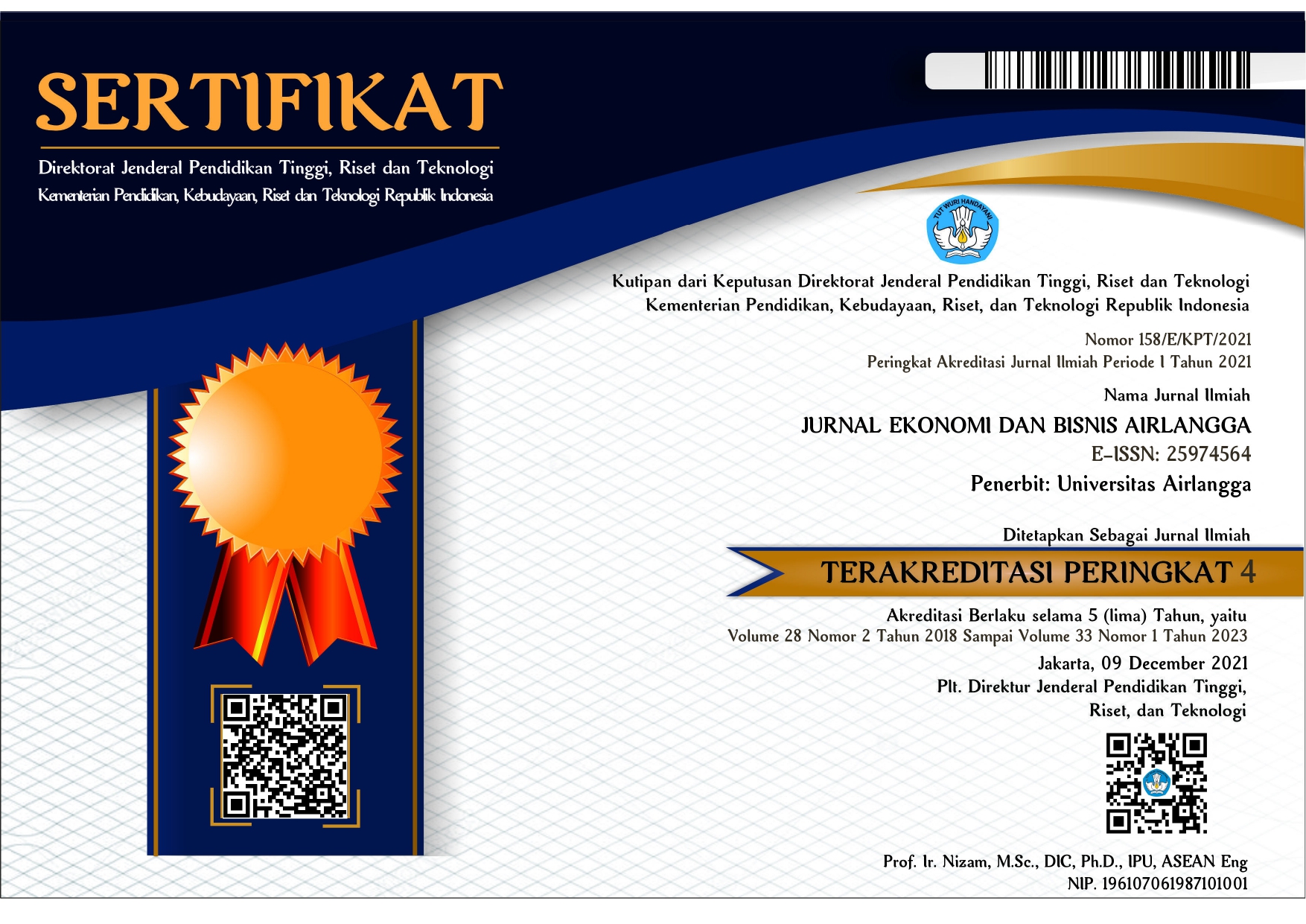PENERAPAN DISIPLIN SEBAGAI PEMODERASI HUBUNGAN ANTARA PEMBERIAN KOMPENSASI DAN PENGHARGAAN TERHADAP KINERJA
Downloads
The purpose of this study was to determine the effect of the compensation and rewards to the employee of BKKBN in East Java Province performance both simultaneously and partially, and was to determine whether the application of discipline moderated the correlation between compensation and rewards distribution to employee's performance. The Method of sample selection used in this study was cluster sampling technique that took randomly from the population. The numbers of the samples of this study were 82 respondents. The type of data used was primary data collected through questionnaire. The regression analysis with variables moderating was used thoroughly in analyzing the data. To prove moderating variable to become mediation variable or not therefore residual test is used. The results of this study showed that giving compensation and awards simultaneously affected to employee's performance. Distributing compensation partially did not affect employee's performance while distributing awards partially affected the performance of the employees. Application of discipline was a moderating variable affecting the correlation between the compensation and rewards distribution to employee's performance.
Azwar, Saifuddin. 2004. Reliabilitas dan Validitas. Yogyakarta: Pustaka Pelajar.
Chen, Li Yueh. 2004. Examining The Effect Of Organizational Culture and Leadership Behaviors On Organizational Commitment, Job Satisfation, And Job Performance At Small And Middle-Sized Firma Of Taiwan. Journal of American Academy of Busines. September 2004. 5.pp 432-438
Darden, W.R., D. McKee and R. Hampton. 1993. Salesperson Employment Status as a Moderator in the Job Satisfaction Model: A Frame of Reference Perspective. The Journal of Personal Selling & Sales Management. Summer 1993, 13,3. pp 1-15
Darwish A. Yousef. 2001. Islamic Work Ethic – A Moderator Between Organizational Commitment and Job Satisfaction in a Cross-Culture Context. Personnel Review. Farnborough:2001. Vol 30. Iss 2.pp 152-166
Edy Sutrisno. 2005. Pengaruh Kualitas Kekaryaan dan Komitmen Terhadap Kinerja Organisasi pada Dinas Pariwisata Propinsi Jawa Timur. Jurnal Ekonomi dan Bisnis Vol. 9 Januari. 2005.hal 17-28
Ferijani, A dan I. Rahutami. 2001. Stres Kerja Karyawan BPR (Studi Kasus Perbarindo Komda Semarang).
Jurnal Dian Ekonomi. Vol VII. No 1. hal 9-18.
Ghozali, M.I. 2009. Aplikasi Analisis Multivariate dengan program SPSS. Semarang: BP Undip.
Handoko. 2001. Manajemen Personalia Dan Sumber Daya Manusia. Yogyakarta: BPFE
Hartijasti ,Yenki. 2001. Hubungan Antara Budaya Organisasi dengan Kinerja Perusahaan. Jurnal Ilmiah Psikologi Terapan, Phronesis. Vol 3. No. 5 Juni 2001.hal 1-19
Indriantoro, Nur dan B. Supomo. 2002. Metode Penelitian Bisnis Untuk Akuntansi dan Bisnis. Yogyakarta: BPFE Yogyakarta.
Inpres RI No 7 Tahun 1999 tentang Akuntabilitas Kinerja Instansi Pemerintah
Irianto, J. 2001. Tema-tema Pokok Manajemen Sumber Daya Manusia. Surabaya: Insan Cendekia
Keputusan Kepala Lembaga Administrasi Negara Nomor 589/IX/6A71999 tentang Pedoman Penyusunan Pelaporan Akuntabilitas Kinerja Instansi Pemerintah
Koesmono, Teman. 2004. Pengaruh Kepribadian Terhadap Komitmen Organisasi dan Perilaku serta Kinerja Karyawan pada Perusahaan Perkayuan Di Jawa Timur. Jurnal Widya Manajemen & Akuntansi, Vol. 4 No. 3. Desember 2004.hal 235-247
Yiing, L.H. and K. Ahmad. 2009. The Moderating Effect Of Organizational Culture On The Relationship Between Leadership Behavior and Organizational Commitment and Between Organizational Commitment and Job Satisfation and Performance. Leadership & Oganization Development Journal Vol. 30 No. 1. 2009.pp 53-86
Mackeana, E. and N. Beech. 1995. Manajemen Sumber Daya Manusia. Terjemahan Toto Budi Santoso Yogyakarta: Andi & Pearson Education Asia Pte.Ltd.
Megawati, Veny dan S. Rahayu. 2002. Pengaruh Corporate Culture, Customer Orientations dam Corporate Innovativeness Terhadap Corporate Performance PT X. Surabaya. Proceeding Temu Ilmiah I AIPO tanggal 2-3 Agustus 2003, hal 231-242
Nitisemito, Alex S. 1986. Manajemen Personalia. Jakarta: Ghalia Indonesia.
Prasetyo, Gendut S. 2002. Analisis Pengaruh Kepuasan Kerja dan Komitmen Organisasi Terhadap Semangat Kerja Karyawan. Jurnal Ventura. Vol. 1. No. 1 Januari 2004.hal 24-33.
Ranupandojo, H, & Husnan, S. 2002. Manajemen Personalia. Yogyakarta: BPFE
Saydan, G. 2000. Manajemen Sumber Daya Manusia, Suatu Pendekatan Mikro (Dalam Tanya Jawab). Jakarta: Djambatan
Sedarmayanti. 2001. Sumber Daya Manusia dan Produktivitas Kerja. Bandung: Mandar Maju. Siagian,S. P. 2002. Kiat Meningkatkan Produktivitas Kerja. Jakarta: Rineka Cipta.
Simamora, Henry. 1997. Manajemen Sumber Daya Manusia. Yogyakarta: STIE YKPN. Sugiono. 2007. Metode Penilaian Bisnis. Bandung: CV Alfabeta.
Sukemi. 2007. Pengaruh Stres Kerja dan Semangat Kerja Terhadap Kinerja Karyawan. Jurnal Ilmiah
Psikologi Terapan, Phronesis. Vol. 9 No. 4. Juni 2007.hal 12-20
Sulistiyani, A.T. dan Rosidah. 2003. Manajemen Sumber Daya Manusia, Konsep, Teori dan Pengembangan dalam Konteks Organisasi Publik. Yogyakarta: Graha Ilmu
Suryanto. 2002. Komitmen Organisasi: Perspektif Psikologi Sosial. Proceeding Temu Ilmiah I APIO tanggal 2-3 Agustus 2003, hal 148-155
Tohardi, A. 2002. Pemahaman Praktis Manajemen Sumber Daya Manusia. Bandung: Mandar Maju. Megasari, Venny dan S. Rahayu. 2003. Pengaruh Corporate Culture, Customer Orientation dan Corporate Innovatiness Terhadap Corporat Performance PT X di Surabaya. Proceeding Temu Ilmiah I APIO tanggal 2-3 Agustus 2003.
The journal allows the author to hold the copyright of the article without restrictions.
The journal allows the author(s) to retain publishing rights without restrictions
The legal formal aspect of journal publication accessibility refers to Creative Commons Attribution Share-Alike (CC BY-SA).
Jurnal Ekonomi dan Bisnis Airlangga (JEBA) is licensed under a Creative Commons Attribution-ShareAlike 4.0 International License





.png)












